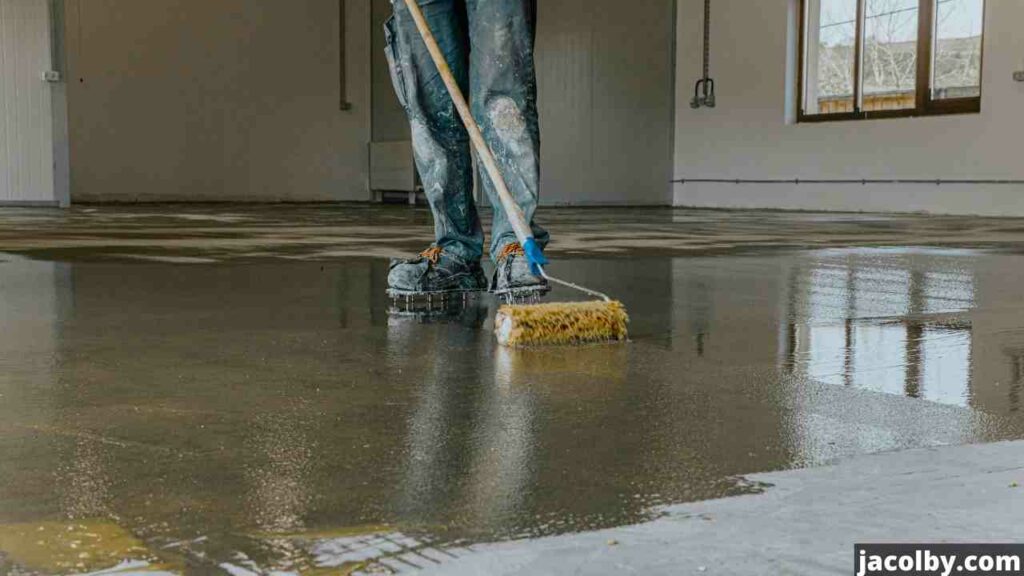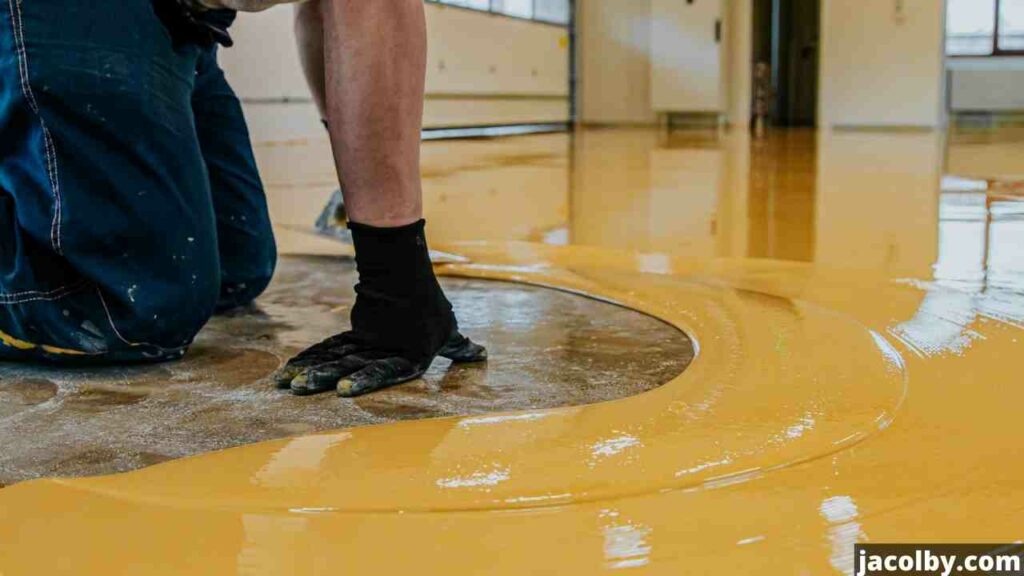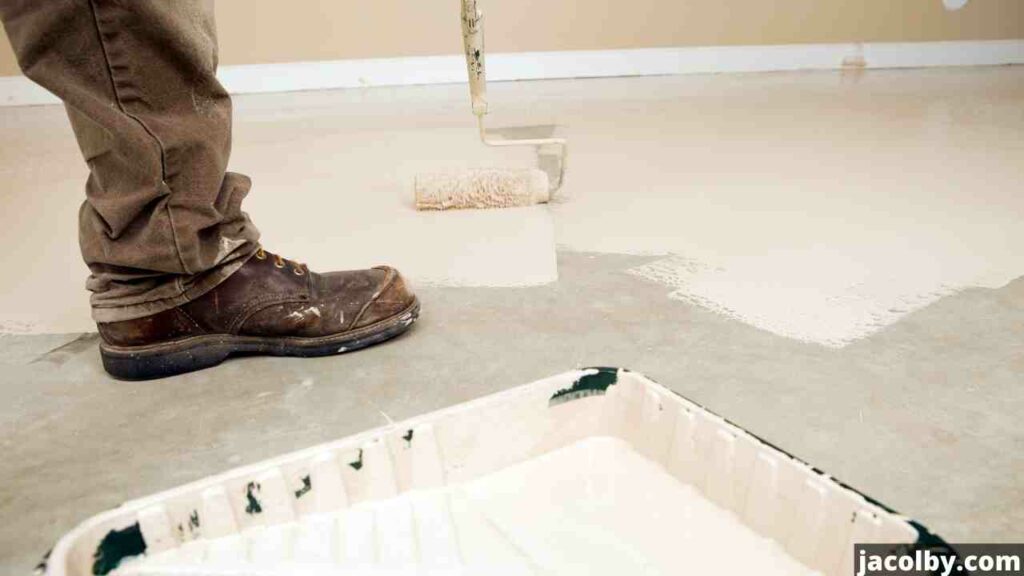
If you’ve found your way here, you’re probably already aware of what concrete is and why it’s so commonly used in construction. Are you, on the other hand, acquainted with epoxy resin’s properties?
To what extent did you realize that epoxy resin may be applied to the surfaces of various materials (metal or wood, for example) to enhance their properties?
One of these qualities is the ability to keep water from permeating a surface. You may apply epoxy resin over concrete if you want to get the advantages of concrete and the waterproofing features of epoxy resin simultaneously.
If you’re seeking a solution to use the many advantages of concrete while also making it watertight, there’s good news.
Why would anybody want to use epoxy resin on the concrete first? The question is, how exactly would you go about achieving that? Epoxy resin differs from other resins in many ways. We must first grasp these differences to answer these issues.
Table of Contents
Is Epoxy Resin Capable Of Being Used On Concrete –
Using this as a starting point, let’s talk about whether or not epoxy can be used over concrete. Well, yes, you can, but there is a twist, don’t worry, I’ll tell you, so read on.
The installation of epoxy on a concrete floor may be a challenging endeavor. Suppose you do not follow the stages in the exact sequence and in the correct order each time.
In that case, the result of your labor will most likely be a bubbled and uneven mess that has to be peeled off. If you do it well, the floor will have a magnificent glossy sheen that is as tough as nails and simple to maintain clean.
However, this only occurs if you apply it correctly. Before applying any epoxy coating, you must ensure that the surface is dry and clear of dust.
The connection that forms between the epoxy and the concrete might be disrupted by the presence of any moisture or particles of dust.
Your shopping basket seems to be empty, so why is that? Once you’ve stocked up on these high-quality epoxy resins for concrete, you’ll enjoy the rewards!
Before beginning any task, employing an industrial vacuum cleaner equipped with a HEPA filter to get rid of any traces of dust is something that is highly recommended by yours truly.
Is It Possible to Pour Resin on Top of Concrete –

Now that I’ve opened your eyes to the fact that you can get a stunning finish over the concrete just by following the directions, this has prompted me to consider, from a completely different angle, whether or not it is safe to pour resin on top of concrete.
To provide a brief response to your inquiry, the short answer is no; resin cannot be poured over concrete if the concrete has not been primed beforehand.
Applying a primer to the concrete surface before pouring in your resin is recommended to help you get the best results with your epoxy project.
This will allow you to get the most out of your epoxy job. Suppose epoxy is put to concrete that has not been primed properly.
In that case, it will not cure properly, which may cause the product to turn yellow or lose its transparency. If epoxy is applied to concrete that has been primed properly, it will cure properly.
Priming concrete with a chemical-based etching agent is one way to make it ready for usage so that it may be put to other purposes.
Because this solution will eat through the surface of the concrete, it will be much easier for any coating, including epoxy, to bond to the concrete appropriately after it has been treated with it.
Suppose the etching process is not stopped, and the etching agent is not neutralized after it is finished. In that case, the surface will continue to be eaten away by the etching agent.
Have you ever wondered whether epoxy resin might be used on outdoor concrete? If you ask similar questions, read on for an in-depth breakdown of the subject.
In what manner should epoxy be applied to a concrete floor –

If you have this knowledge, you must be curious about how the epoxy resin is applied to the concrete. I’ll give you a small taste of that.
Be sure to clean the concrete floor before applying the epoxy thoroughly. Repairs need to be made to the holes and fractures in the concrete.
After applying a concrete etching solution with a brush, let it sit for 15 minutes. After the etching has been completed, wash with water.
After that, follow the instructions provided by the manufacturer for applying a primer to the floor. Epoxy should be spread using a paint roller following the instructions provided by the manufacturer.
When applying primer and epoxy, you should avoid leaving puddles since this may lead to unsightly dry spots. Your epoxy has to be completely dry before you may tread on it or move anything else.
If you want to know the answer to the question “How do you put epoxy resin on concrete?” then you should read this article which will provide you with the necessary steps to take.
There might be a snag in the process if you’re wondering whether or not epoxy resin will stick to smooth concrete. So keep reading this post, and it will lead you right to the solution.
How Much Longer Do You Have to Wait –
The average time I recommend in the business for curing concrete is 28 days or four weeks. The time frame may need to be extended even further depending on the climate, the amount of shade, and the relative humidity.
To ascertain whether or not your freshly poured concrete is ready for a polymer coating, California Custom Coatings will put it through a series of tests consisting of various procedures.
Suggestions For Coating Fresh Concrete –

Now that you are familiar with the procedure, the following are some recommendations for covering a newly placed concrete:
A semi-permeable epoxy coating is a bare minimum that we would propose, even though this sort of coating does not possess the same toughness and longevity as conventional epoxy resin flooring.
Therefore, before painting the concrete floor, it is highly recommended that you wait for it to get dehydrated first. If you don’t do this, your epoxy resin floor might end up with bubbles, cracks, and flaking, which are quite unattractive.
We know that many things, like epoxy resin and epoxy paint, can be applied to concrete; if you’re among those who have wondered, “How do I apply primer to concrete?” then this article is for you.
FAQs –
Is it Possible to Accelerate the Curing Process With Heat?
The time required to cure is cut down, and the process is sped up when Heat is added.
During the curing phase, the best technique to speed up the hardening of the epoxy is to provide Heat to the system using a heat lamp or an oven. This will allow the epoxy to solidify more rapidly.
Is it Possible to Decrease the Viscosity by Adding Heat?
One may take two approaches to reduce the viscosity of an epoxy resin. The first technique calls for preheating the resin and the curing agent in their respective containers before mixing them.
The second step is to heat the area that will be coated with epoxy before you apply it.
Can I use resin as a casting medium when making a concrete mold?
The functionality of molds made from silicone will equal that of molds made from silicone that are meant to operate with resin and concrete.
Silicone molds may be constructed in several different shapes and sizes. You need to be able to depend on its performance being on par with that of a tool specifically designed to be used with concrete.
Conclusion –
Now You have gained a better understanding of what epoxy resin is and how to evaluate the tensile strength of your concrete surface to decide whether it is suitable for applying epoxy resin.
In addition, you came across a few pointers for those who want to employ epoxy resin in an outdoor setting.
To get a beautiful new epoxy resin coating on top of the existing concrete, you must pay close attention to the surface preparation process.